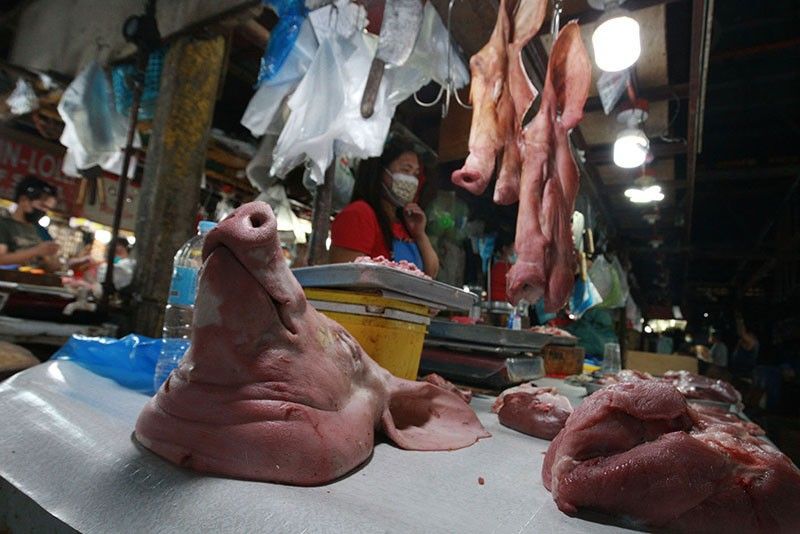Duterte ready to listen to senators on pork tariff

MANILA, Philippines — President Duterte is ready to listen to senators who oppose the lowering of tariffs on pork because of its possible impact on the local hog industry, Malacañang said yesterday.
Senate Minority Leader Franklin Drilon, agriculture committee chair Sen. Cynthia Villar and Sen. Francis Pangilinan are planning to file a resolution to revoke Executive Order 128, which will temporarily reduce tariff rates on pork imports to address supply shortage.
Drilon claimed the lower tariffs would “kill” the local hog industry and lead to billions of pesos in foregone state revenues.
“The President listens to everyone, especially if senators raise their concerns together,” presidential spokesman Harry Roque said at a press briefing.
Roque said senators who are against the lower tariffs have pointed out that the prices of pork are not lowered when sold to the public despite the lower landed cost.
“They cannot understand why there is a need to lower the tariffs since it has not resulted in lower prices of pork products in the market. I think the President will listen to our senators because he listens to everyone,” he added.
The order covers the import duty rates on fresh, chilled or frozen swine meat. The adjusted tariff rates will be effective for one year.
The tariff rate for in-quota imports of fresh, chilled or frozen carcasses and half-carcasses, hams, shoulders and cuts and other products will be five percent for the first three months upon effectivity of the order, 10 percent for the fourth to 12th month and 30 percent after the 12th month.
For out-quota pork imports, the tariff rates will be 15 percent for the first three months, 20 percent for the fourth to 12th month and 40 percent after the 12th month.
“There is an urgent need to temporarily reduce the most favored nation tariff rates on fresh, chilled or frozen meat of swine to address the existing pork supply shortage, stabilize prices of pork meat and minimize inflation rates,” the order read.
“By law, the authority of the President to fix tariff rates while Congress is not in session can be withdrawn or revoked by virtue of a joint resolution,” Drilon said.
He cited Republic Act 10863 or the Customs Modernization and Tariff Act, which was the basis of EO 128. The law allows the President to increase, reduce or remove existing rates of import duty “while Congress is not in session.”
Section 1608 (f) of the law, however, provides that “the power herein delegated to the President may be withdrawn or terminated by Congress through a joint resolution.”
“EO 128 will kill the local hog industry, not the African swine fever or ASF. The irrational and drastic decision to increase the minimum access volume or MAV serves as a final ‘nail in the coffin’ of the local hog industry,” Drilon said.
“Our local hog raisers suffered a double blow in the last two weeks, and it is the duty of Congress to stand up for them. Small hog raisers cannot stand up against giant importers of meat products,” he added.
Senate President Vicente Sotto III also said yesterday senators are likely to band together in urging Duterte to withdraw EO 128 and his order to raise the MAV for pork to 350,000 metric tons (MT) in the coming months as part of the administration’s attempts to reduce prices of the protein source.
Sotto said, at the very least, the Senate would ask Duterte to restore the tariffs to the original rate of 30 percent for those under the MAV and 40 percent outside the import quota while allowing slightly higher importations.
“(There is) no clear indication on why they want tariff lowered when they want the MAV expanded,” Sotto told reporters in a text message.
Senators also viewed with suspicion Duterte’s move to submit his request to Congress to raise the MAV on March 26, the last day of session of Congress before it went on a break.
Under the law, the President can take action on quotas and import volumes only when Congress is not in session. If Congress does not act on such a request of the President after 15 days, the same is deemed in effect.
Sen. Panfilo Lacson, whose resolution led to the convening of the Senate committee of the whole’s inquiry into the food crisis and alleged corruption in pork imports at the Department of Agriculture (DA), was skeptical that Duterte would actually yield to lawmakers on the matter.
“Unfortunately, that’s Secretary Roque speaking, not the President himself. (Duterte’s) track record in giving importance to the collective sense of the Senate speaks for itself,” Lacson said.
He added that the Senate took a collective stance as expressed in at least two adopted resolutions and “(Duterte) did not only ignore them; he did not even take the time to discuss the issues with at least the senior officials of the Senate.”
Duterte may not have to study the facts and revelations at the Senate inquiry last Monday, but he should take time to listen to the plight of the dying backyard hog raisers and the foregone revenues that the government will deal with, especially at this time of the pandemic, according to Lacson.
During the all-member panel hearing last Monday, DA officials could not give a guarantee that pork prices in public markets will go down because of the flooding of imports and lowering of tariffs.
The hearing will resume tomorrow. – Eva Visperas
- Latest
- Trending


























